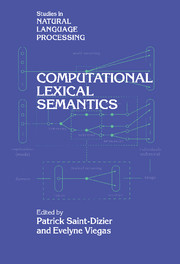Book contents
- Frontmatter
- Contents
- List of contributors
- Preface
- 1 An introduction to lexical semantics from a linguistic and a psycholinguistic perspective
- Part I Psycholinguistics for lexical semantics
- Part II Foundational issues in lexical semantics
- 4 Linguistic constraints on type coercion
- 5 From lexical semantics to text analysis
- 6 Lexical functions, generative lexicons and the world
- 7 Semantic features in a generic lexicon
- Part III Lexical databases
- Part IV Lexical semantics and artificial intelligence
- Part V Applications
- Part VI Computer models for lexical semantics
- Author index
- Subject index
6 - Lexical functions, generative lexicons and the world
Published online by Cambridge University Press: 29 September 2009
- Frontmatter
- Contents
- List of contributors
- Preface
- 1 An introduction to lexical semantics from a linguistic and a psycholinguistic perspective
- Part I Psycholinguistics for lexical semantics
- Part II Foundational issues in lexical semantics
- 4 Linguistic constraints on type coercion
- 5 From lexical semantics to text analysis
- 6 Lexical functions, generative lexicons and the world
- 7 Semantic features in a generic lexicon
- Part III Lexical databases
- Part IV Lexical semantics and artificial intelligence
- Part V Applications
- Part VI Computer models for lexical semantics
- Author index
- Subject index
Summary
Introduction
The connections between the study of natural language semantics, especially lexical semantics, and knowledge representation are manifold. One of the reasons why lexical semantics holds this place is obvious when one looks at compositional denotational theories of meaning. Here, one tries to account for the meaning of expressions in terms of a relation between linguistic expressions and the world. The dictionary makes explicit what part of the world each basic item refers to, whereas the grammar rules are associated with general instructions to combine the meanings of parts into the meanings of wholes. Most natural language understanding systems cannot relegate the interpretation function of basic items (as contained in the dictionary) to some mysterious interpretation function, say 'as in the case of Montague semantics, but have to be more explicit about the world and the substantive relation between basic expressions and the assumed ontology. Actual explanatory dictionaries can be viewed as stating complex relationships between natural language expressions. This perspective focuses on the fact that definitions are stated in language. The other perspective is focused on what is described: one could also say that a definition is the representation of a constraint on the world/model or the specification of the (now less mysterious) interpretation function for basic expressions.
Although it may not be realistic to argue that knowledge representation problems can be totally equated with problems of lexical semantics, there is enough reason to take notice of the latter when dealing with the former. Certainly this is the case where one deals with knowledge representation for natural language understanding. Within this general perspective we take the following position.
- Type
- Chapter
- Information
- Computational Lexical Semantics , pp. 125 - 140Publisher: Cambridge University PressPrint publication year: 1995
- 1
- Cited by

